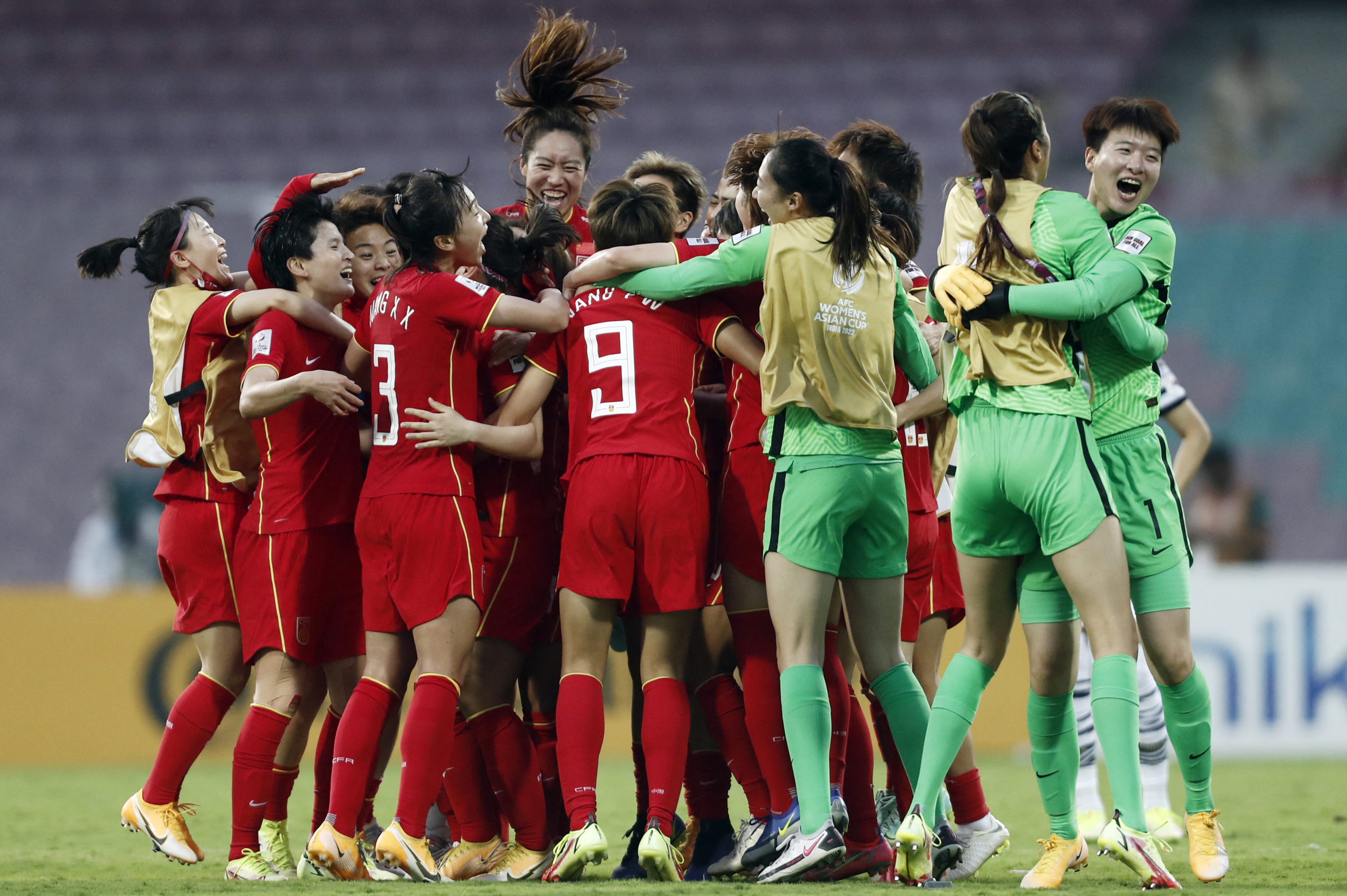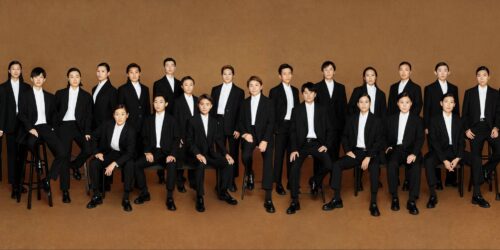China Women’s Asian Cup victory sets off impassioned calls for equal pay and end to sexist coverage
The Chinese women’s national soccer team is a consistent top performer and a fan favorite, but they earn much less than the men’s team which is famous mostly for losing.

On Sunday, Chinese soccer fans saw an amazing feat by the country’s women’s national team as they fought back from two goals down to defeat South Korea 3-2 in a dramatic final in India, clinching their record-extending ninth title of the Asian Football Confederation (AFC) Women’s Asian Cup.
But the victory was bittersweet, as it highlighted the longstanding hypocrisy of the pay gap between the men’s team and the women’s team — the latter of which has been way more successful on the field than their male counterparts despite earning significantly less. And now, in the wake of the hard-fought win, Chinese social media is exploding with calls for better treatment of women athletes in multiple areas, including equal pay, prize money, and media coverage.
The nail-biting game over the weekend was a testament of the incredible skills and endurance shown by the women’s team throughout the tournament. As Gerry Harker, author of The China Project’s weekly sports column, noted, “it was quite a feat for China to even reach the finals, as it had to twice overcome a deficit against two-time defending champion Japan in the semifinals (including scoring a 119th-minute goal to tie it up in extra time).”
The female players’ victory garnered strong TV ratings in China and tremendous social media buzz, demonstrating a popularity and success that their counterparts on the China men’s national soccer team could only dream about. Currently standing at 19th in the FIFA world rankings (compared to the men’s position at 74), the Chinese women’s team is the strongest at the Women’s Asian cup. With the latest victory, the women’s team has won nine titles, including seven consecutive championships from 1986 to 1999.
China news, weekly.
Sign up for The China Project’s weekly newsletter, our free roundup of the most important China stories.
In stark contrast, the national men’s team has long been a subject of mockery and derision by Chinese sports fans due to its embarrassing performance. And as social media users showered the women with praise, calling their victory “a moment of tremendous pride for China,” they didn’t miss the opportunity to make humorous digs at the men’s team, which has been ruthlessly ridiculed online after falling 3-1 to Vietnam last week, a humiliating loss that officially ended its qualification campaign for 2022 World Cup.
But despite the women’s superior results, they earn way less money than their male counterparts. According to a 2018 report by the Chinese Football Association (in Chinese), for players in the Chinese Women’s Super League and League One — the top two women’s leagues in the country, fewer than 20% of them earned over 10,000 yuan ($1,572) per month. In an interview with Soccer News (in Chinese), Liú Yǒu刘友, the head coach and general manager of Super League team Changchun Zhuoyue, revealed that although wages for female soccer players had increased notably in the past few years, the best paid players in the women’s leagues rarely earn more than 2 million yuan ($314,376) annually — roughly 20 percent of their male counterparts’ salaries. For female players without endorsement deals and less star power, Liu said that the numbers could be a lot lower.
The difference in pay was even wider before. A 2003 article noted (in Chinese) that the annual income of Sūn Wén 孙雯, who was the superstar on the women’s team during its golden era and was named co-FIFA Female Player of the Century in 2000, was only 10% of what an average male Chinese soccer player made at the time. Zhào Lìnà 赵丽娜, who currently plays as a goalkeeper for the Chinese national team, once publicly complained (in Chinese) that she couldn’t afford to buy an apartment despite being the best goalkeeper in the country.
As information about the pay disparity spread, Chinese internet users quickly went from cheering the victory to demanding economic equality for the women’s team. On the night of the win, hashtag “pay raise for women soccer players” #给女足加钱# appeared on Weibo’s trending topic list with more than 100 millions views. “Equal pay for equal work. I want full transparency from the Chinese Football Association,” a Weibo user wrote (in Chinese). Some complaints argued that it was unfair to just ask for equal pay for the women because they were way more successful than their male counterparts on the field. “They did better work! They deserve to be paid at least twice as much!” a person commented (in Chinese) on Weibo.
Also joining the call were a slew of Chinese companies that decided to narrow the pay gap by giving out bonus money. On Monday, Chinese payment platform Alipay, which launched a ten-year, 1 billion yuan ($157.2 million) commitment in 2019 to support the development of women’s soccer in China, announced that it would give the players 13 million yuan ($2.04 million) as a reward for their victory. The team’s sponsor Mengniu, a Chinese dairy company, also promised a 10 million yuan ($1.57 million) cash prize for the players.
Beyond the pay disparity, some internet users also took issue with the media coverage of the women’s team’s win, calling out several articles for being “sexist” and “trivializing their accomplishments.” A specific piece that has come under intense fire is one published by Dahe Daily, a Chinese newspaper based in Zhengzhou, Henan Province. In the article, the mother of 王珊珊, captain of the national team, is asked about her daughter’s dating life and qualities she wants in her future son-in-law. “Wang’s dating life is none of your business,” a Weibo user commented (in Chinese), while another one said (in Chinese), “Why didn’t you ask those male players when they would finally get their bodies in shape and get six-pack abs?”
The longstanding problem of soccer’s gender wage gap is not exclusive to China. In recent years, the issue has been brought to worldwide attention as the U.S. women’s national team, the best women’s soccer team in the world, embarked on an ongoing battle for pay equity. In March 2019, the U.S. team, led by Megan Rapinoe, filed a pay discrimination lawsuit against the U.S. Soccer Federation, claiming the organization had discriminated against them because of their gender, resulting in unequal pay and unequal working conditions compared to the U.S. men’s national team. The labor dispute was dismissed by a judge in May 2020, but the women players decided to appeal and submitted their closing written argument last year in a bid to overturn the dismissal.






